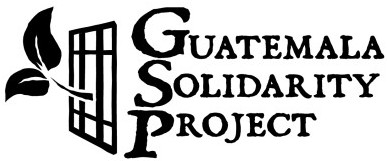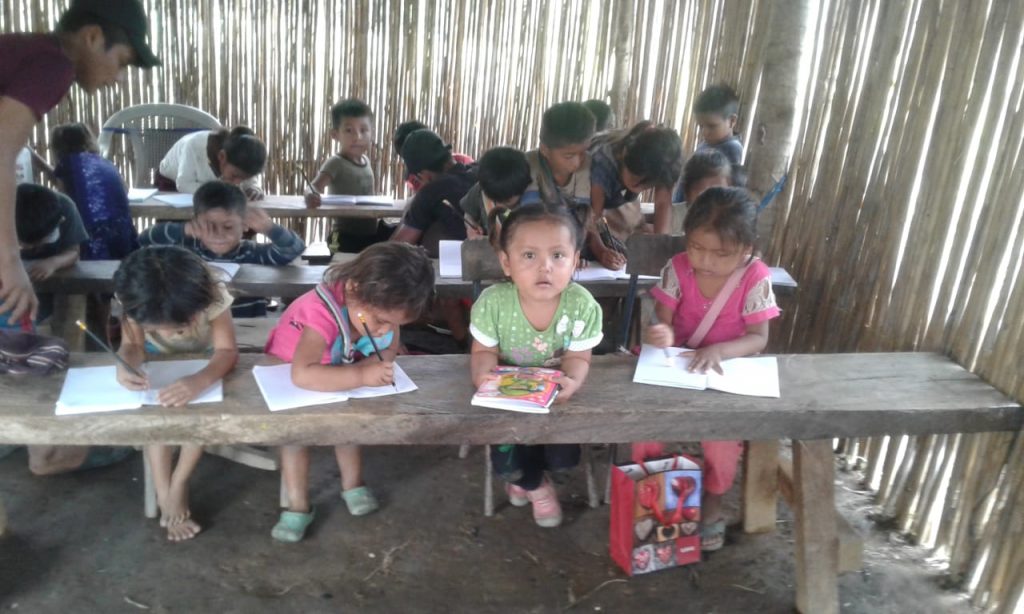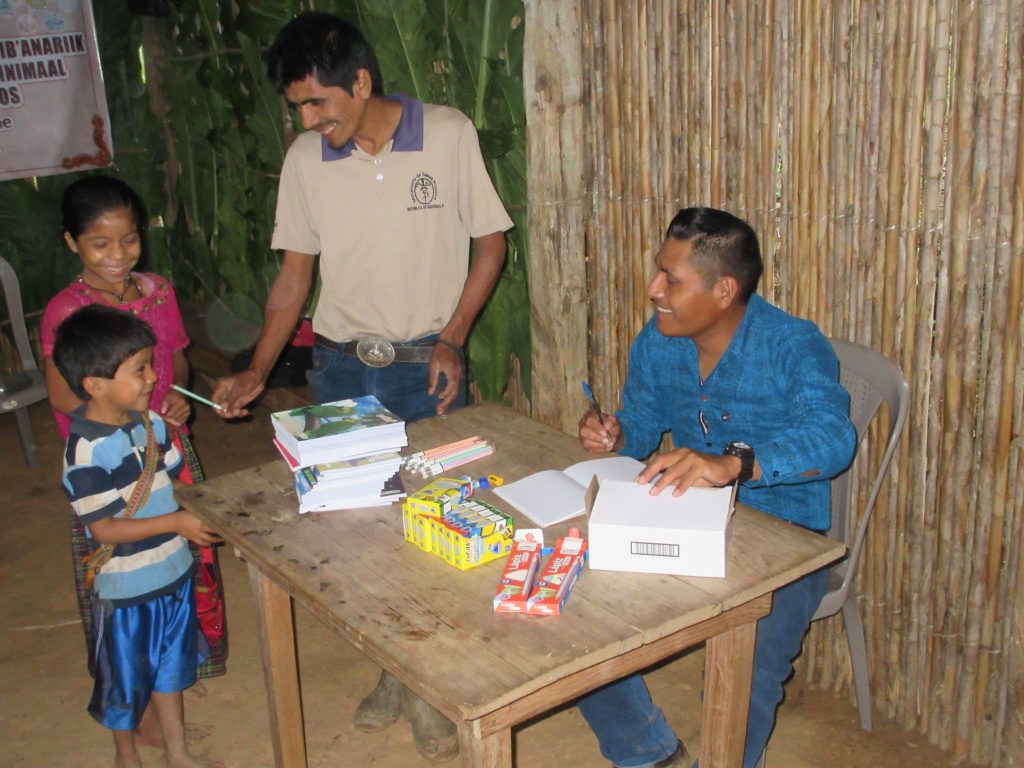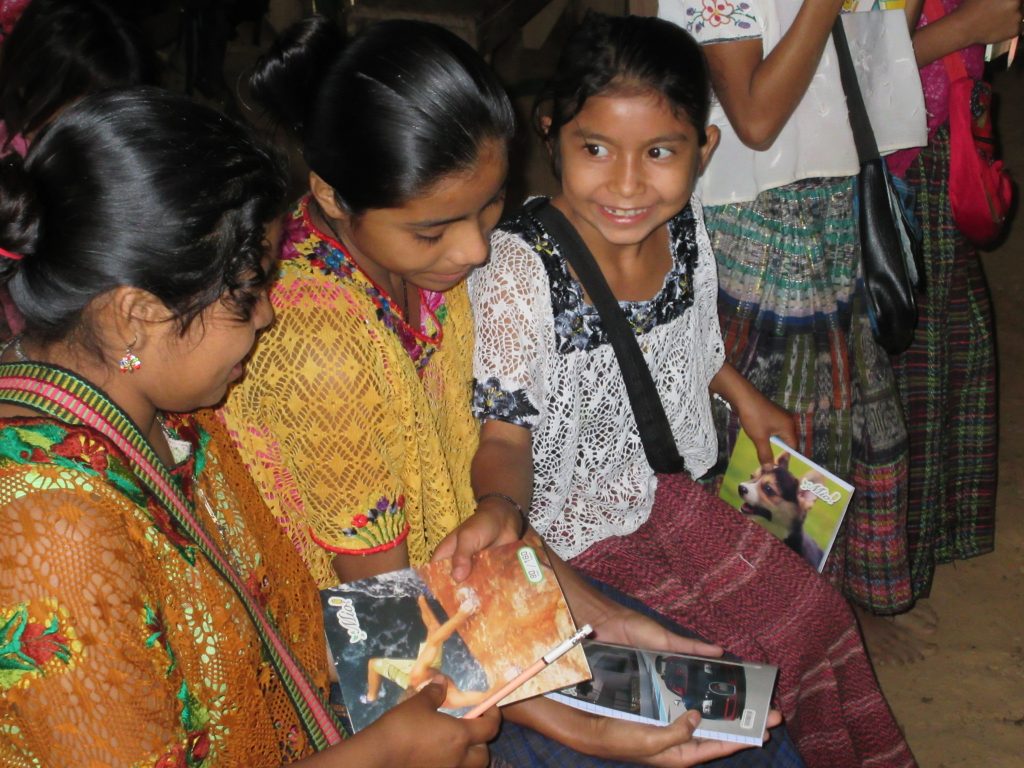This is an incomplete overview of our work and recent developments involving our partner communities, located primarily but not entirely in Q’eqchi’, Poqom, Ixil and Xinca territory in Guatemala. This report is also available online at http://www.guatemalasolidarityproject.org/qraug2020/ where it is accompanied by several new videos we have recently published.
We are facing a financial crisis as the COVID pandemic has forced us to cancel dozens of fundraisers. We are in danger of having to end numerous monthly commitments including terminating our mobile school program, monthly visits to political prisoners, and support for our small but spectacular health team. Please consider making a donation of any size. All donations go to our partners. You can donate via our website or by writing a check to UPAVIM and mailing it to UPAVIM, PO Box 63, Marshfield, VT 05658. We thank our fiscal sponsor, the volunteer-run UPAVIM Community Development Foundation, a US 501(c)3 non-profit tax-deductible organization, for supporting us and ensuring that all funds go to our partners in Guatemala. Additional suggested actions are at the end of this report.
STATE OF SIEGE/PREVENTION CAUSES STARVATION
On July 19, the Guatemalan government declared a State of Siege in five municipalities of northeastern Guatemala, suspending basic constitutional rights, including freedom of speech and assembly and allowing the military to conduct house searches and make arrests without warrants. The decree makes all meetings of two or more people illegal.
The State of Siege is completely unrelated to COVID. Rather, the government argues that the State of Siege is necessary to combat “groups of organized crime that commit illicit activities like drug trafficking, illegal migration, contraband and other acts.” Drug trafficking indeed affects communities in the region in a marked and negative way. The networks and families involved in these activities are widely known in the region and nationally. They are not peasants or human rights defenders. Nor have they been associated with insurgent initiatives, since, as Commissioner Iván Velásquez of the International Commission Against Impunity explained on September 3, 2019, in Guatemala drug trafficking networks prefer to exert high levels of influence within state structures, including the capture of the state through the co-optation of institutions. By this means, they carry out all kinds of illegal actions, including acts of extreme violence, illegal land grabbing, and trafficking in illegal substances, without being sanctioned or limited by the state apparatus.
Last year the government also declared a State of Siege which lasted two months, saying it was to fight drug trafficking. It is startling to consider that zero significant arrests of drug traffickers were made during that time.
Instead, the State of Siege last year and again this year has been used to limit the work of human rights and environmental organizers in the area. Nearly all of the military actions that have been reported on during the current State of Siege have been against communities that are part of the Committee for Peasant Unity (Comite de Unidad Campesina or CUC for its Spanish acronym), one of our closest partners. CUC is a historic indigenous and peasant rights organization known internationally for their work against genocide as well as for former member and Nobel Peace Prize winner Rigoberta Menchu.
Last month a 22-month-old child, Joselin Nohemi Coy Yat, died of starvation in one of our partner communities that is in the area covered by the State of Siege. Joselin and numerous other children in her community had been specifically identified by our health team as at risk for death of starvation and we had planned to visit in late July with medicine, vitamins, concentrated proteins and other support. Because of the State of Siege, we were unable to. Thousands more children are on the brink of starvation, a situation worsened by this military operation and the suspension of constitutional rights.
A State of Siege must be passed by the Guatemalan Congress. Despite this fact, the president sent the military to the area on the day of the declaration, and they operated there for over a week without authorization from Congress. Finally, on July 28, the President declared a “State of Prevention” in the exact same area. The main difference between a State of Siege and a State of Prevention is that the State of Prevention does not need the approval of Congress and lasts 15 days instead of 30. On August 16 the State of Prevention was renewed, and hundreds of indigenous communities are living today under direct military rule.
We believe the real reason for the State of Siege/State of Prevention is to support the Guatemalan Nickel Company, which runs one of the largest nickel mines in Central America. In June of this year the Constitutional Court of Guatemala upheld previous rulings ordering the mine to immediately cease operations and stating that it had been operating illegally since 2004. The mine continues to operate despite the ruling, and its illegal activities are being ignored by the military. We believe the State of Siege/State of Prevention also was declared to support banana and African palm plantations which have been illegally expanding by violently evicting indigenous communities in the area.
We do not know to what extent the US government is supporting or coordinating the State of Prevention, but we do know that the US routinely provides equipment, training, and direct oversight to the Guatemalan military and intelligence agencies despite their long track record of genocide and human rights abuses. We are pressuring members of congress to end this support and we need your voice to bring about this change. Suggestions for contacting members of congress are at the end of this report.
POPULAR MOBILE SCHOOL PROGRAM CONTINUES WITH COVID ADJUSTMENTS
Our mobile school program has restarted after a nearly three month suspension due to the COVID pandemic. We are closely following health guidelines and government regulations regarding schools. Currently our teachers are providing instruction directly in the home of each family in order to prevent large class gatherings.
Thanks to our donors, we are providing basic education to children in eleven communities that the government has denied access to education. The government is legally required to provide access to education for all children in Guatemala, but they are refusing to do so in the majority of our partner communities. We have previously had success in helping start new schools and then using them to pressure the government to accept their responsibility to send teachers. It often takes years, but our goal is to continue to collaborate with local education committees until each of these eleven communities has access to education.
This year we did have a major victory as the government chose to recognize the school at our partner community Pancuz. Despite this we still continue to send a teacher to Pancuz because the government only assigned two teachers for over 120 students.
Our partners feel the mobile schools are doing fundamentally important work and have asked us to continue to support them. However because of the COVID-related funding crisis we are in danger of having to end the program. Please consider making a donation now to help us keep these schools open.
DOS FUENTES AND SURROUNDING POQOM COMMUNITIES FACE CONTINUED VIOLENCE RELATED TO ILLEGAL HYDROELECTRIC DAM EXPANSION
Attacks continue against our partner community Dos Fuentes. The violence is in support of the Pananish company which is facilitating the theft of land and natural resources for the construction of hydroelectric dams. A new short video on our website shows how indigenous communities are being displaced to expand hydroelectric dams, but even local clinics are left without electricity.
On July 27 and 28, 2020, private security of the company Pananish attacked the community Dos Fuentes. Two community leaders were shot in the back, including Mario Chun Caal. Chun remains in the hospital as of this writing, and it appears he may be paraplegic for the rest of his life. His family has been unable to visit, and instead Chun is accompanied by police who say they will transfer him to jail as soon as his health stabilizes. Like many indigenous leaders in the region, Chun is being charged with “land theft” for his role in nonviolent organizing in support of indigenous rights and the environment.
Police have refused to investigate or hold responsible those who shot Chun in the back. On July 20, 2018, Pananish private security attacked Dos Fuentes and murdered community leader Adolfo Ichich Chom. No one was held accountable for his death.
On August 3, 2020, Carlos Enrique Coy disappeared. Coy is a leader from the community Nueva Gloria, which neighbors Dos Fuentes. Coy was friends with Chun and they often participated in the same meetings and protests. Coy’s family believes that those responsible for his disappearance are the Pananish company private security. A new 5-minute video featuring an interview with family members is available on our website.
Coy is known in the area for his humility, hard work and eloquence. He was a county council candidate in 2015, but his party did not participate in the 2019 election because of repeated death threats. Coy is also a Pastor, and on August 9 local search teams found his bible discarded in the forest. The Guatemalan authorities are refusing to participate in the search for Carlos Enrique Coy, who remains missing as of the publishing of this alert. We are extremely concerned that he either has already been killed or is currently being tortured. The only related statement that has been made by the US embassy is a request for the Guatemalan government to protect the rights of investors.
COURT RULINGS RETURN THOUSANDS OF ACRES TO INDIGENOUS COMMUNITIES
A series of historic Constitutional Court rulings in July and August returned nearly two hundred thousand acres of land to indigenous communities. The Constitutional Court is the highest court in Guatemala. While the GSP did not play a lead role in these cases, some of our partners did. Their extraordinary vision and courage allowed them to persist through death threats and limited resources to uncover irrefutable evidence supporting indigenous land rights.
On July 23, 2020, the court ruled that over 60,000 acres of land must be returned to indigenous Ch’orti’ communities. The court began their order with the basic yet important ruling that Ch’orti’ people exist. Hydroelectric and other resource extraction companies had claimed that indigenous Ch’orti’ people no longer exist in the disputed area and therefore natural resources in their territory can be looted. This ridiculous claim was rejected by the court, which also declared that the Ch’orti’ people have the right to self determination, including collective land ownership.
Also in July, the Constitutional Court ruled that over 110,000 acres of land must be returned to indigenous Ixil communities. The court recognized that these communities had been victims of genocide and land theft in the early 1980s, and that their lands must be returned.
While both communities recognized these historic victories, leaders also expressed significant concern that the government, military and multinational corporations would ignore the rulings. There is also significant concern that these historic achievements will lead to increased violence and fraudulent arrest warrants against Ch’orti’ and Ixil leaders.
We are working closely with our partners on advancing similar cases in Q’eqchi’ and Poqom’ territory. Our partners have recently uncovered significant documentation of illegal land theft that may force the government to recognize the territorial rights of many indigenous communities.
CONSTITUTIONAL CRISIS
The judicial system in Guatemala is known to be among the most corrupt on earth. However, recently the Constitutional Court has followed the law in a number of rulings recognizing the legal rights of indigenous people. These rulings have infuriated the president, corrupt members of congress, the US embassy and multinational corporations which have profited from human rights abuses.
In what most of our partners are denouncing as a coup d’etat, the president and congress are attempting to purge the Constitutional Court. They have even threatened to jail Constitutional Court magistrates who recognize the legal rights of indigenous people. If they are successful it will have massive short and long term ramifications, making it significantly easier for multinational corporations and the military to violently evict indigenous communities and steal natural resources from their land. We will be closely monitoring this developing crisis.
BERNARDO CAAL RECOGNIZED BY AMNESTY INTERNATIONAL, BUT HEARINGS ARE POSTPONED AGAIN
Our friend Bernardo Caal has been in prison since January 30, 2018. He was arrested shortly after being named as the lead complainant in a series of injunctions against the illegal construction of hydroelectric dams in Q’eqchi’ territory. On November 9, 2018 he was sentenced to seven years and four months in prison for allegedly leading violent protests against the dams, although no evidence was presented to support this allegation. Based on the lack of evidence and apparent conflicts of interest involving a judge in the case, Caal’s legal team filed an appeal on November 30, 2018. Since that time over 60 magistrates have either postponed or simply not showed up to the scheduled appeal hearings. On July 28, 2020, Caal was brought from prison to the latest scheduled appeal hearing, and it was once again cancelled at the last minute.
On July 16 of this year, Amnesty International declared Caal a Prisoner of Conscience. Amnesty stated that “Having reviewed the ongoing criminal proceedings against Bernardo Caal, it’s clear that there’s no evidence of the crimes that he’s accused of.”
We will continue to visit Caal in prison regularly. We hope that with the support of Amnesty International we will be able to collaborate with our partners and win freedom for Bernardo Caal.
COVID IN GUATEMALA
As of the publishing of this report, there have been approximately 70,000 confirmed COVID cases and 2,600 confirmed deaths in Guatemala. The government put in place strict restrictions on travel and large gatherings well before most other countries in the hemisphere, and these restrictions initially appeared to limit the spread of COVID. At the same time, the government actively supported the continued operation of large businesses (even when operating illegally such as the Guatemalan Nickel Company) without supporting the needs of poor and working people. As acute hunger increased, a “white flag movement” began in which people who had no access to food displayed white flags as a way of requesting support and solidarity.
Two developments have led to an extremely concerning rise in COVID cases in Guatemala. The first is deportations from the United States. It appears that the US has intentionally deported hundreds of COVID-infected detainees to Guatemala. Meanwhile the government of Guatemala responded to pressure from big businesses and ended many travel and work restrictions, leading to a significant rise in COVID cases and deaths.
We are extremely concerned about the harm that COVID will cause in a country that has permitted its health care system to remain in shambles. Most indigenous communities have no access to basic health care services.
The GSP is combating the spread of COVID by focusing on education and prevention through our mobile school program. Thanks to our donors, we have hired a nurse who is focusing on supporting the 11 communities that are participating in the mobile schools. The nurse is helping teachers, parents and children with resources and knowledge to help prevent COVID infection. The nurse is also supporting malnourished children and pregnant and nursing mothers in the 11 communities as well as other GSP partner communities.
TAKE ACTION
We recommend you take the following actions in solidarity with our partners in Guatemala:
DONATE
All donations go to our partners. You can donate via our website or by making a check out to UPAVIM and mailing it to UPAVIM, PO Box 63, Marshfield, VT 05658. We thank our fiscal sponsor, the volunteer-run UPAVIM Community Development Foundation, a US 501(c)3 non-profit tax-deductible organization, for supporting us and ensuring that all funds go to our partners in Guatemala.
CALL YOUR MEMBERS OF CONGRESS
Call your members of congress and ask them to oppose the State of Prevention. You can call (202) 224-3121 (or find contact info online) and ask to speak with your member of congress.
Sample text:
“Hello my name is _________ and I live in your district. I am calling to ask the congressperson to oppose the State of Prevention that has been declared in northeastern Guatemala. The State of Prevention suspends even the most basic rights such as freedom of the press, and gives the military the power to make arrests without a warrant. This is being done in support of mining and other extraction companies that are committing massive atrocities against the environment and indigenous populations, leaving many with no choice but to seek refuge sometimes all the way to the United States. Meanwhile children are starving to death and the military isn’t allowing human rights groups to operate in the region. Our government must immediately end its support for the State of Prevention. I ask that the congressperson express opposition to the State of Prevention via social media, by contacting the US State Department to express concern, and by supporting future efforts in congress to end US support for human rights violations in Guatemala.”
JOIN OUR URGENT ACTION EMAIL LIST
Send an email with the subject line “Add to urgent action list” to info@guatemalasolidarityproject.org Often when we collaborate with our partners to organize a quick response to human rights violations we are able to help deescalate the situation before it becomes worse.
LIKE US ON SOCIAL MEDIA
Thanks in large part to the great work of our volunteer interns, the GSP has expanded our presence on social media. Many GSP activists don’t even use social media, but we recognize its value in publicizing the struggles of our partner communities. If you haven’t done so already, please like and follow us on social media!
Twitter: SolidarityGuate
Instagram: GuatemalaSolidarityProject
Facebook: https://www.facebook.com/guatemalasolidarityproject/



